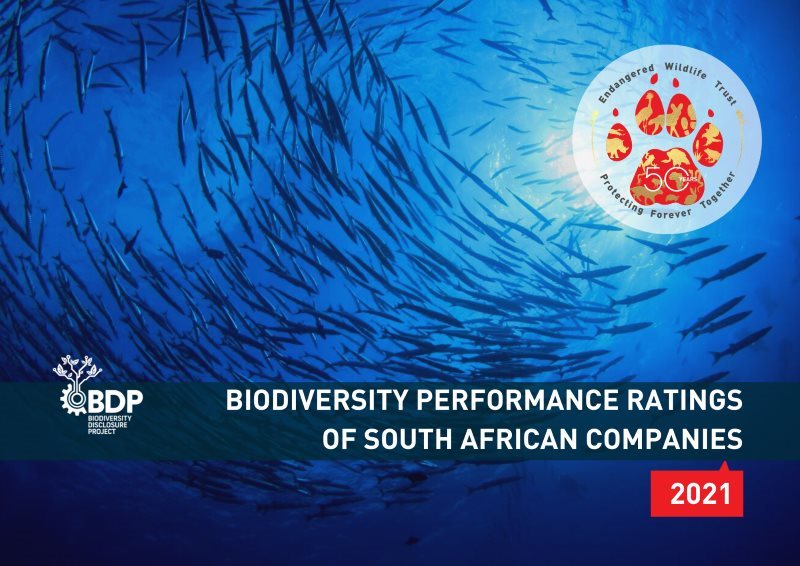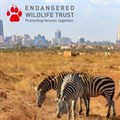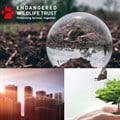
Image: Supplied
One of the first organisations to focus on measuring corporate biodiversity performance globally, the Endangered Wildlife Trust (EWT), through its National Biodiversity and Business Network, launched the Biodiversity Disclosure Project (BDP) in 2018. The BDP makes a case for why companies should acknowledge their biodiversity dependencies and impacts and reduce their negative impacts. The BDP annual ratings report presents scientific assessments of how each company listed on the JSE and state-owned enterprises (SOEs) report on their biodiversity policies and performance.
Assessment
The assessment asks eight key questions about how companies mainstream biodiversity - from having any policy that recognises and measures dependencies and impacts, having a biodiversity strategy, targets, and key performance indicators (KPI), to disclosing performance and having a monitoring system. Each question has a maximum score of four (giving a maximum possible score of 32). Each assessed company was contacted with draft results which they could bolster with any additional information before publication.
Releasing the latest Biodiversity Disclosure Project Ratings of South African Companies at a national Indaba held to celebrate International Biodiversity Day on 22 May 2023, Dr Gabi Teren, programme manager of the EWT’s National Biodiversity and Business Network (NBBN), stressed that while there was a minimal improvement since the previous ratings report, more work is urgently needed. For the fourth annual assessment (2021-2022 reporting period), 267 JSE-listed companies and 27 State-Owned Enterprises (SOEs) were evaluated. The top three scoring organisations, out of the 294 assessed, were Anglo-American (18/32), Sibanye-Stillwater Limited (17.5/32), and British American Tobacco PLC (17/32).
Overall recognition of biodiversity (ie. achieving any score above zero out of 32) has risen from 22% of 354 companies in 2020 to 35% of 294 companies in the 2021 reporting period. The results, however, suggest that fewer companies are now disclosing or implementing biodiversity action plans, with average scores for this specific question lower than in previous years.
Sector ratings
The report details each sector’s performance, giving an overview of trends with examples from sustainability reports. Unsurprisingly the basic materials sector was again the highest-performing sector, with 78% of companies recognising biodiversity as material. Given its environmental legacies, historical and ongoing stakeholder concerns, and a strong policy/legal environment focused on no-net loss of key biodiversity components, this is imperative for the sector. Leading companies should go beyond only having strongly worded policies and targets and move to measuring, managing, and disclosing their biodiversity footprints with science-based evidence to support their commitments.
The financial sector scores poorly overall, with only 7 out of 44 companies showing any recognition of biodiversity. Finance institutions have far-reaching opportunities to address the biodiversity crisis by actively engaging with their clients and scrutinising their investment portfolios. A cross-sectoral portfolio and client base also make financial institutions susceptible to biodiversity risks. First Rand and Absa lead the sector ratings by at least assessing and acknowledging these emerging risks.
Global framework
The Kunming-Montreal Global Biodiversity Framework (GBF), finalised in December 2022, commits South Africa and 195 other countries to implementing the GBF goals and targets, and several of these are related to businesses.
The Minister of the Department of Forestry, Fisheries, and the Environment, Barbara Creecy, gave the opening speech at the NBBN Indaba and stressed how there needs to be greater private-public sector collaboration to meet the goals of the GBF.
“Sustainable development and transformation require the private sector and government to work together to achieve common goals. In the case of biodiversity conservation, businesses can contribute significantly by adopting environmentally responsible practices, promoting sustainable development, and minimising negative impacts on fragile ecosystems. However, achieving these goals will require the government to draw up supportive policies and enforce environmental regulations effectively,” Creecy said.
The event concluded with round-table discussions (view here) of how South Africa is moving forward with the change leaders in South African businesses, such as Anglo-American, Mondi, First-Rand and Glencore. Jonathon Hanks, who led the JSE Sustainability Disclosure Guidance Project, said that companies should recognise the effectiveness of reporting but that it is only effective if we hold companies to account.
The BDP gives everyone that tool to do so. In the week following the report’s publication, Nedbank was called out for its low scores at their AGM by an activist investor, Gordon Laing, showing how shareholders are beginning to hold businesses accountable for biodiversity commitments.
Disclosure requirements
Target 15 of the GBF requires businesses to assess and disclose biodiversity dependencies, impacts and risks and reduce negative impacts. The target pushes companies to move beyond voluntary broad sustainability disclosure, and much like greenhouse gas emissions, they need to accurately measure and disclose their impacts on ecosystems and species and have clear, actionable targets in place to reduce those impacts.
If South Africa is to meet its commitment of conserving 30% of nature by 2030 (Target 3 of the GBF), then business will need to play a bigger role, and there is still much room for improvement among companies that need to account for their biodiversity assets.
Through the BD Protocol developed by the EWT and partners, it is now possible for any company to:
- Develop biodiversity impact inventories
- Measure their biodiversity footprints
- Set up science-based biodiversity targets
- Disclose their performance in a standardised, coherent and credible manner.
For more information, see: nbbnbdp.org








































